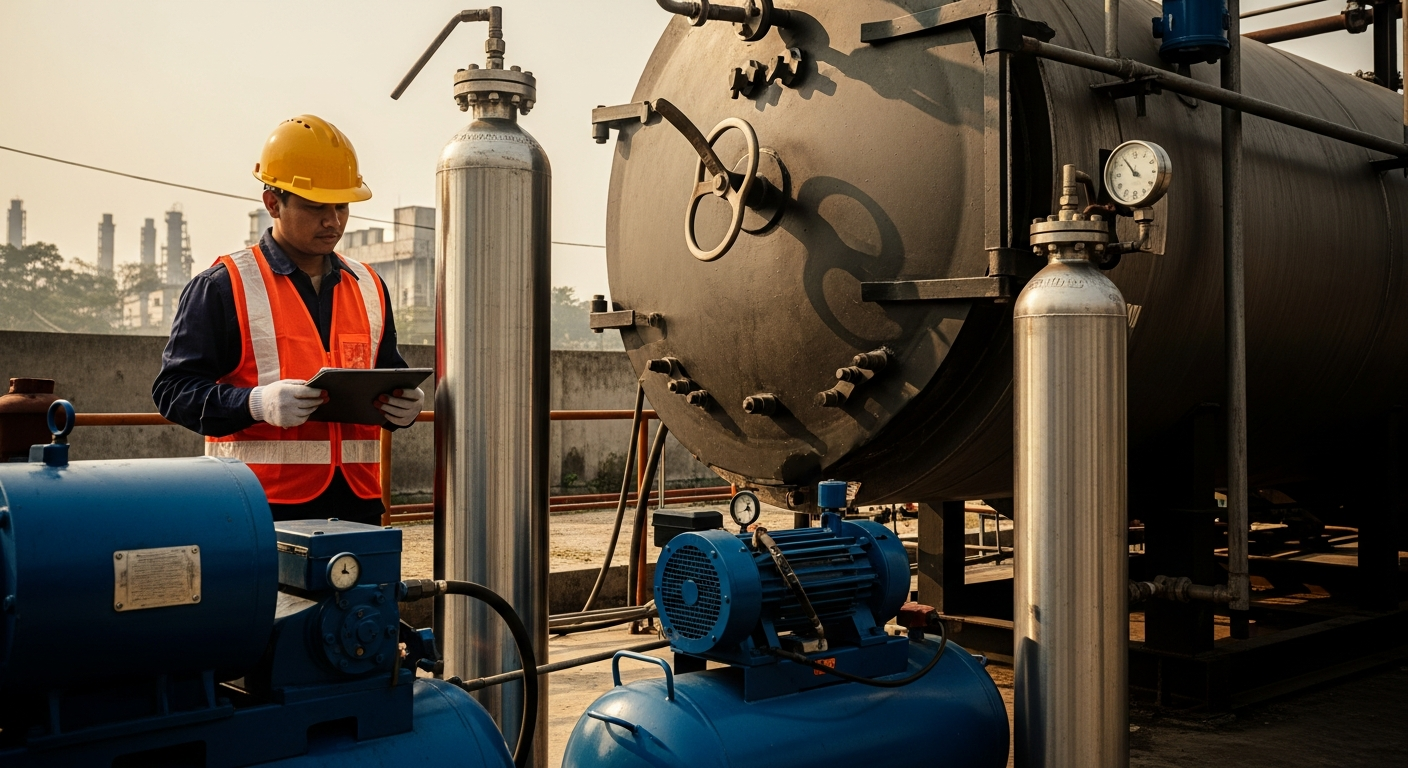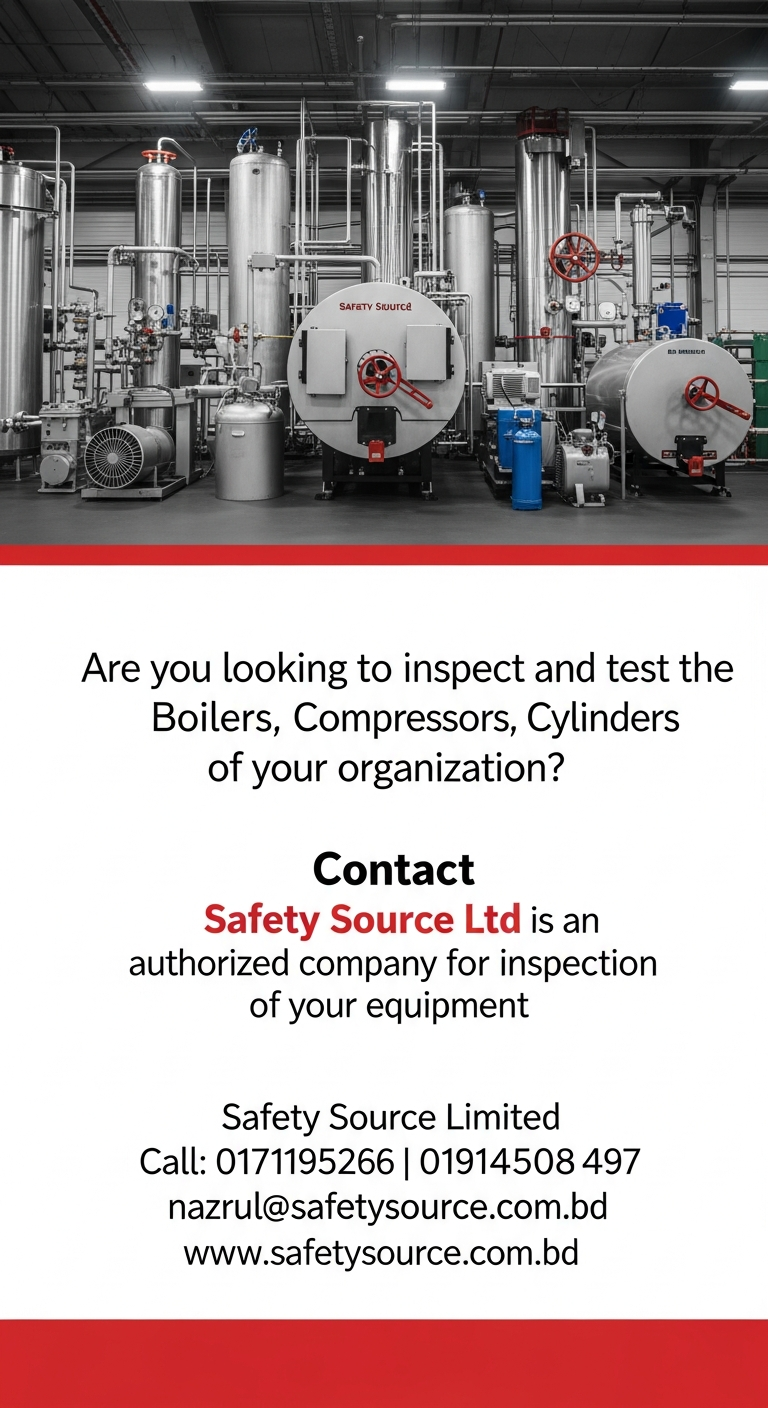Introduction
Every thriving industrial sector stands on one non-negotiable pillar — safety. In Bangladesh, where manufacturing, textiles, shipbuilding, and energy industries are expanding rapidly, ensuring the safe operation of mechanical equipment such as boilers, cylinders, and compressors has become both a legal requirement and a moral obligation.
The inspection and testing of these systems are not merely technical exercises; they are critical safeguards that prevent loss of life, protect assets, and ensure compliance with national and international safety standards. Authorized companies, certified by the Department of Inspection for Factories and Establishments (DIFE), carry out this responsibility with precision and accountability.
Why Equipment Inspection Matters
Industrial accidents are often traced back to neglected maintenance and uninspected machinery. Boilers can explode from unchecked pressure buildup, compressors may fail due to overloading, and cylinders can leak hazardous gases when corroded or damaged.
A 2023 study by Bangladesh’s industrial safety authorities revealed that over 35% of industrial accidents involved uninspected or overdue equipment. Regular inspection mitigates these risks by ensuring mechanical integrity, operational efficiency, and worker safety.
A Practical Illustration
Imagine a textile factory operating a steam boiler rated for 10 bar pressure. Over time, sediment accumulation reduces its water level sensor accuracy. Without inspection, the pressure might exceed its safe limit, leading to a catastrophic explosion. However, a standard DIFE-approved inspection detects such anomalies early, preventing disaster and costly downtime.
Legal Framework and Regulatory Oversight
In Bangladesh, the Boiler Act 1923 and the Factories Act 1965, along with DIFE’s safety regulations, require periodic inspection of industrial boilers, compressors, pressure vessels, and gas cylinders.
Each inspection is conducted by a licensed inspection engineer or an authorized inspection company under DIFE’s supervision. These inspections certify that the equipment meets the prescribed standards for pressure, temperature, safety valves, and operational reliability.
Failure to comply can result in penalties, shutdown orders, or loss of factory licenses. More importantly, it exposes employees and property to significant safety risks — an unacceptable outcome in any modern industrial operation.
Types of Equipment Covered
Industrial inspection services in Bangladesh generally cover:
- Boilers: Steam, water-tube, and fire-tube boilers used in textile, chemical, and energy plants.
- Compressors: Air and gas compressors in manufacturing units, oil refineries, and construction sites.
- Cylinders: Gas cylinders, storage vessels, and pressure containers used in various industrial applications.
- Pressure Vessels: Storage tanks or reactors that contain liquids or gases under pressure.
- Lifting Equipment: Cranes, hoists, and elevators, which are often part of integrated inspection packages.
Each type of equipment demands specialized testing techniques, including ultrasonic thickness measurement, hydrostatic pressure tests, leak detection, and valve calibration.
The Science Behind Inspection and Testing
Inspection is both an art and a science. It involves a series of engineering evaluations that identify fatigue, corrosion, and deformation before failure occurs.
For instance, during a boiler inspection, engineers may calculate the Maximum Allowable Working Pressure (MAWP) using formulas that consider shell thickness, material strength, and temperature coefficient. A simplified version of the formula looks like this:
MAWP = (2 × t × S × E) / (R × F)
where t = wall thickness, S = tensile strength, E = weld efficiency, R = radius, and F = safety factor.
This kind of technical assessment ensures the equipment’s safe operational range and helps factories plan predictive maintenance schedules rather than waiting for breakdowns.
Why DIFE Authorization Matters
The Department of Inspection for Factories and Establishments (DIFE) is the governing authority in Bangladesh that ensures industrial safety compliance.
Only DIFE-approved inspection companies are permitted to conduct official testing and certification. These organizations employ qualified mechanical and safety engineers, use calibrated instruments, and follow recognized testing standards such as ASME, API, or BSI.
Authorization by DIFE guarantees that inspection reports are legally valid and accepted by both national regulators and international buyers — a critical factor for export-oriented industries such as garments, pharmaceuticals, and shipbuilding.
Benefits of Regular Industrial Equipment Inspection
1. Enhanced Safety and Reliability
Periodic inspection reduces the likelihood of catastrophic failures. A well-maintained compressor consumes less energy, operates smoothly, and minimizes downtime.
2. Cost Efficiency
Early detection of cracks or corrosion prevents costly replacements. Preventive maintenance costs roughly 30–40% less than emergency repair or total replacement.
3. Legal and Insurance Compliance
Factories that maintain up-to-date inspection records find it easier to renew licenses and obtain industrial insurance.
4. Environmental Protection
Leaking cylinders or defective boilers can emit harmful gases or pollutants. Regular inspection helps align operations with environmental sustainability goals.
A Tale of Two Factories: A Success and a Failure
In 2022, a food processing plant in Gazipur suffered severe financial loss after a compressor explosion halted production for three weeks. The post-incident investigation revealed that the compressor had not been tested for two years.
In contrast, a competing facility nearby conducted semi-annual industrial equipment safety inspections and faced zero downtime that year. Their preventive maintenance program saved an estimated BDT 4.5 million in lost production costs — a clear example of how inspection translates directly to profitability.
Expert Insight
“Inspection is not an expense; it’s an investment in operational security,”
says Engr. Rahman Kabir, a certified mechanical engineer and industrial safety consultant in Dhaka.
“Factories that budget for periodic testing avoid unpredictable failures and ensure continuous production flow.”
Globally, industries that adopt a culture of preventive inspection see a 25–50% increase in equipment life expectancy, according to international industrial safety reports.
 Global Relevance: Lessons from Abroad
Global Relevance: Lessons from Abroad
Countries like Japan, Germany, and Singapore have integrated inspection systems linked to their national digital safety networks. Bangladesh is moving in the same direction, with DIFE gradually implementing digital tracking for inspection certificates and renewal alerts.
Such modernization ensures transparency, improves safety data management, and aligns Bangladesh’s industrial safety practices with ISO 45001 and ASME Boiler and Pressure Vessel Code standards.
Choosing an Authorized Inspection Company
When selecting an authorized inspection company in Bangladesh, consider:
- DIFE authorization certificate number and validity.
- Experience with relevant industrial sectors.
- Use of advanced non-destructive testing (NDT) equipment.
- Qualified and licensed inspection engineers.
- Transparent reporting and after-inspection support.
A reliable inspection partner not only identifies issues but also recommends practical corrective actions that minimize future risks.
Industrial Safety Compliance in Bangladesh: The Way Forward
Bangladesh’s industrial landscape is evolving fast. With foreign investments increasing and export compliance becoming stricter, industrial safety compliance is no longer optional — it’s integral to business continuity.
Factories that integrate inspection into their annual maintenance schedules not only meet local regulations but also build international trust. Global buyers now prioritize supply chain partners that demonstrate certified safety and sustainability.
Conclusion
Boiler, cylinder, and compressor inspection is more than a technical necessity — it is the foundation of industrial safety and legal compliance in Bangladesh. Regular testing ensures safer workplaces, uninterrupted production, and sustainable industrial growth.
The message is clear: prevention costs less than correction. Companies that embrace inspection as a proactive culture, not a bureaucratic requirement, protect both people and profit.
Among the authorized inspection providers in the country, Safety Source Ltd, based in Dhaka, stands out as a DIFE-approved and professionally managed inspection company. With a team of experienced engineers and a commitment to quality, they perform inspection and testing of boilers, cylinders, compressors, and other industrial equipment with care, accuracy, and full compliance with national regulations.
References
- Department of Inspection for Factories and Establishments (DIFE), Government of Bangladesh
- The Boiler Act 1923 (Bangladesh)
- International Labour Organization (ILO): Industrial Safety and Hazard Prevention Reports
- ASME Boiler and Pressure Vessel Code


 Global Relevance: Lessons from Abroad
Global Relevance: Lessons from Abroad